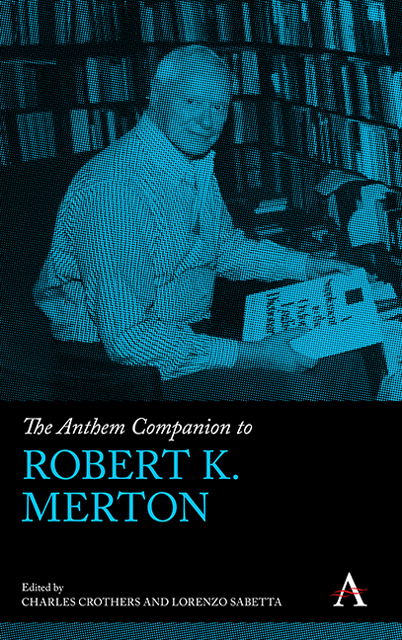Book contents
- Frontmatter
- Dedication
- Contents
- List of Figures and Tables
- Chapter One Introduction: Merton’s Self-Exemplifying Classical Sociological Contributions
- Chapter Two Skeptical Faith, Left Politics, and the Making of Young Robert K. Merton
- Chapter Three Theorist’s Progress: Young Robert K. Merton, 1941–1949
- Chapter Four Taking a Seminar with Merton
- Chapter Five The Development of Mertonian Status-and-Role Theory
- Chapter Six Theory as an Option or Theory as a Must? The Bearing of Methodological Choices on the Role of Sociological Theory
- Chapter Seven “Interviews of a Special Type”: Robert K. Merton and Codification of the Focused Interview
- Chapter Eight Science as a Culture
- Chapter Nine “Providing Puzzles”: Science as Norms and Values
- Chapter Ten A Mertonian Breviary for Cultural Sociologists
- Chapter Eleven The Unpublished Robert K Merton
- Author Biographies
- Index
Chapter Two - Skeptical Faith, Left Politics, and the Making of Young Robert K. Merton
Published online by Cambridge University Press: 10 January 2023
- Frontmatter
- Dedication
- Contents
- List of Figures and Tables
- Chapter One Introduction: Merton’s Self-Exemplifying Classical Sociological Contributions
- Chapter Two Skeptical Faith, Left Politics, and the Making of Young Robert K. Merton
- Chapter Three Theorist’s Progress: Young Robert K. Merton, 1941–1949
- Chapter Four Taking a Seminar with Merton
- Chapter Five The Development of Mertonian Status-and-Role Theory
- Chapter Six Theory as an Option or Theory as a Must? The Bearing of Methodological Choices on the Role of Sociological Theory
- Chapter Seven “Interviews of a Special Type”: Robert K. Merton and Codification of the Focused Interview
- Chapter Eight Science as a Culture
- Chapter Nine “Providing Puzzles”: Science as Norms and Values
- Chapter Ten A Mertonian Breviary for Cultural Sociologists
- Chapter Eleven The Unpublished Robert K Merton
- Author Biographies
- Index
Summary
“Faith in the continued disclosing of truth through directed cooperative endeavor is more religious in quality than is any faith in a completed revelation.”
—John Dewey, A Common Faith (1934, 26)In his final lectures, Pierre Bourdieu reconsidered his opinion of Robert K. Merton (RKM). He confessed that early in his career, as “a newcomer in an international field dominated by Merton and structural functionalism,” he had had been unfair to Merton (Bourdieu 2004, 12). Since that time, he had developed new awareness of “the political conditions” under which he formulated his classic norms of science, which Bourdieu now saw “as a way of setting the scientific ideal in opposition to barbarism” (2004, 13). He had also learned about Merton's “personal trajectory.” The man he had first seen, at a conference in which he was “king,” as “an elegant, refined WASP was in reality a recent Jewish immigrant” who had adopted a refined “British” style, not unlike other “first-generation immigrants underdoing integration and eager for recognition”—a disposition that “was probably also at the root of his scientific practice and his exaltation of the ‘profession’ of sociology, which he wanted to establish as a scientific profession” (2004, 13). Bourdieu was not alone in attributing a kind of British elegance to Merton, the son of Russian Jewish immigrants, nor in being ignorant of the political dimensions of Merton's classic early work.
Neither Merton's Jewishness nor his politics are straightforward matters, and both changed over his lifetime. Nonetheless, I’ll argue that delving into them throws important light on his life and work, a case I’ll make by investigating them in the contexts of his formative, early years—from his birth in 1910 through the publication of the first edition of Social Theory and Social Structure (1949; STSS). One of his ablest interpreters, Alan Sica, suggests that “Merton was already Merton at a young age” (2010, 65; see also 1998, 2019). I agree but add two caveats. First, we don't fully understand how “Merton was already Merton” without seeing how he carried forward elements of freethinking American Jewish culture as it played out in the first decades of the twentieth century. Second, there were changes in the politics of Merton's sociology from the preto the post-1949 period.
- Type
- Chapter
- Information
- The Anthem Companion to Robert K. Merton , pp. 35 - 50Publisher: Anthem PressPrint publication year: 2022



